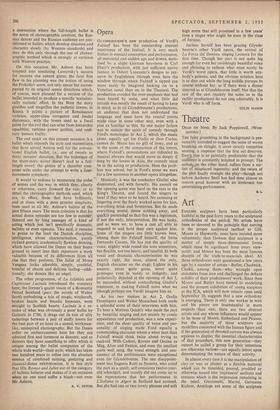Opera
GLYNDEBOURNE'S new production of Verdi's Falstaff has been the outstanding musical experience of the festival. It is very much Italian in musical conception and performance, all mercurial and sudden ups and downs, stabi- lised by a slight German heaviness in Carl Ebert's production, with just sufficient native fantasy in Osbert Lancaster's designs to pre- serve its Englishness (though even here the window through which Falstaff is tipped can more easily be imagined looking on to a Venetian canal than on to the Thames). The production avoided the over-emphasis that had been feared by some, and what little did intrude was mostly the result of having to keep in mind, as in all Glyndebourne's productions, an audience that does not understand the language and must have the crucial points made clear in some other way, even with a plot as familiar as this. Its one major failure was to sustain the spirit of comedy through Ford's monologue in Act 2, which the music alone, equally apt for Otello or Don Carlos, cannot do. Music has no gift of irony, and as in the scene of the comparison of the letters, where Falstaff's protestations are ridiculed to musical phrases that would move us deeply if sung by the lovers in Aida, the comedy must be in the acting or production. Here the prob- lem was solved, but in Ford's scene we were for a few moments in another opera altogether.
Musically it was the conductor Giulini who dominated, and with ferocity. His assault on the opening scene was hard on the ears in the King's Theatre, and forced the singers to bawl if they were to be heard. No caressing or lingering over the finely worked score for him, everything brisk and boisterous. But he made everything sound, threw nothing away, and quickly persuaded us that this was a legitimate, if not the only, interpretation. He was lucky, ,and so were we, to have a cast all able to respond to and hold their own against him. Some of the singers are little known here, among them the Falstaff himself, the Swiss Fernando Corena. He has just the quality of voice, slightly wide round the note sometimes, but flexible, not too heavy, and tuneful. In both vocal and dramatic characterisation he was exactly right, the most, almost the only, English character on the stage. Lighter in his manner, never quite gross, never quite grotesque even in vanity or indignity, and pathetically dejected at the opening of Act 3, he succeeded, without contradicting Giulini's treatment, in making Falstaff more what we (though perhaps not Verdi) imagine him as. • As his two visitors in Act 2, Oralia Dominguez and Walter Monachesi both made a splendid scene of their interviews with him. To hear a Mistress Quickly who made the part by beautiful singing and .not mainly by comic appearance and production, was a new experi- ence, and the sheer quality of voice and per- sonality of singing made Ford equally a commanding character whom a wiser man than Falstaff would think twice about trying to cuckold. With Cadoni, Rovere and Oncina as Meg, Alice and Fenton, and even the smallest parts well sung, the vocal strength and con- sistency of the performance were exceptional even for Glyndeboume. The one disappoint- ment was Eugenia Ratti as Nanetta, who acted the part as a spoilt, self-conscious twelve-year- old schoolgirl, and vocally did not come up to the expectations that her performance in L'Italiana in Algeri in Holland had aroused. But she had one or two lovely phrases and soft high notes that still promised in a few years' time a singer who might be even in the class of Jurinac.
Jurinac herself has been gracing Glynde- bourne's other Verdi opera, the revival of La Forza del Destino, singing Leonora for the first time. Though her part is not quite big enough for even her ravishingly beautiful voice and phrasing to redeem what must surely be Verdi's worst opera, that little is worth any- body's guineas, and the obvious solution here is to dine out while the long middle pursues its course without her, as if there were a dinner interval as at Glyndebourne itself. Not that the rest of the cast (mainly the same as in the earlier production) do not sing admirably. It is Verdi who is off form.
COLIN MASON


































 Previous page
Previous page